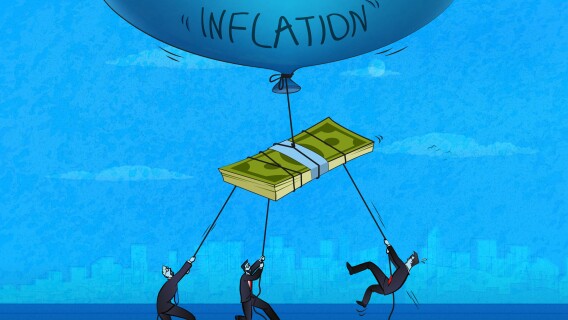The market is thriving in the happy space between inflation and recession. But this nirvana state may prove temporary.
For more than a year, the market indexes have rallied as inflation trended sharply lower while the economy remained solid. We are getting through this rate hiking cycle, the steepest in decades, without the usual economic pain. It seems inflation is being licked on the cheap. But such a course of events is logically and historically unlikely. The Devil will collect his due eventually.
Inflation spiked to the highest level in more than forty years over the last three years for good reasons. The Government has injected about $9 trillion into the economy since the pandemic and increased the money supply by about a third. In addition, higher energy prices and the fact that the Fed left rates near zero while the economy was already booming added to the problem.
Sure, inflation is way down. The Consumer Price Index was 3.1% in January, down from a high of 9.1% in June of 2022. But the latest number was higher than expected and still well above the Fed’s 2% target rate. Inflation remains sticky even though the Fed Funds rate is the highest in more than 20 years and the benchmark ten-year Treasury yield is still at the highest level since before the Great Financial Crisis.
[text_ad]
Stickiness has always been a problem with inflation. Once that genie gets out of the bottle, it’s tough to put back in. In fact, any time in the past when inflation averaged 5% or higher for a year or more it took at least a decade to get rid of it. Several times in the 1970s Fed policies got inflation “under control.” But every time it came back worse than before as soon as the Fed took its foot off the gas. This Fed knows this and will be reluctant to pursue policies that might allow inflation to be a problem for the rest of the decade, especially since the problem is partly of their own making.
The current high interest rates aren’t finishing inflation. Lower rates will make it worse. That’s the quandary. The Fed will have to at least leave interest rates high to hold back inflation unless or until the economy tanks. If inflation is to be neutralized, rates will have to stay high until they drive the economy into a ditch.
High interest rates will eventually bite. Consumers are maxed out on credit. New loans charge the highest rate of interest in decades and prices are on average already more than 18% higher than they were three years ago. Companies have to roll over debt eventually. And the new rates are far higher than the old ones, which will increase costs. The economy has been buoyant so far. However, the Fed will likely have to lower rates soon to save this recovery. But they can’t, at least to an impactful degree.
Investors are expecting rate cuts this year beginning in June. There will be considerable disappointment if that doesn’t happen. Even if the Fed does cut the Fed Funds rate, the cut will be small, and speculation will immediately begin about the next rate cut. The cuts are unlikely to be large enough to spur the economy and assuage Wall Street. Investor disappointment with the recent Fed statement may be the beginning of the realization of the bigger-picture catch-22.
If the Fed doesn’t cut rates enough, the economy will slow to some degree. And the slowing is almost impossible to control. It can be like a controlled burn managed by the Three Stooges. We know the market doesn’t like inflation and rising rates. That’s what caused the 2022 bear market. It won’t like recession either.
Don’t get used to the current market dynamic. The Goldilocks situation where inflation falls while the economy thrives won’t last. Sure, the economy may stay solid for a while longer. It’s an election year. The powers that be will do anything to juice the economy through November. Plus, the market still has the huge artificial intelligence catalyst. And defensive stocks are cheap. But the inflation/recession quandary isn’t going away. It will likely be the next big thing the market contends with.
Understand the change coming ahead of time, before the market freaks, and diversify into investments beyond what is working today.
[author_ad]
